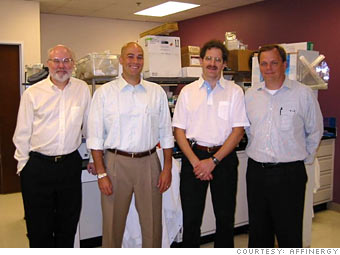Location: Durham, N.C.
Grant: $3 million (March 2008)
From: National Institute of Health
Employees: 32
Affinergy Inc. develops interfacial biomaterials, which CEO Peyton Anderson likens to glue or two-sided tape. But instead of sticking crayon drawings to the wall, the startup's peptide technology helps drugs hold on to implanted medical devices, potentially reducing health complications. For example, attaching antibodies to a hip replacement could stave off infections, which are sometime fatal. "We can have a direct and large impact on patients," Anderson says. "These are real people with real problems."
Affinergy's story goes back to Duke University when its founders, then a chemist and a biologist at the school, collaborated on an academic project that produced biological linking molecules able to stick medicine to metal, plastic, or even Teflon. The five-year-old company received the first of its 12 SBIR grants in 2005, and to date has earned a total of $5.3 million from the National Institute of Health. The government awards have paid for research and development to demonstrate that the idea works, which fueled interest by prospective partners. The money also empowered Affinergy to develop its science for devices in multiple areas - from cardiology to general surgery.
Affinergy has also organized $5 million in outside funding, including about a $1 million from a small venture-capital firm, and an undisclosed amount from its partners, which include chemical giant DuPont. Products are still three to five years away from reaching market. - Herman Wong
NEXT: NovaShield Inc.

